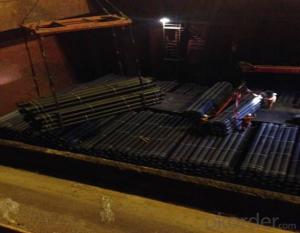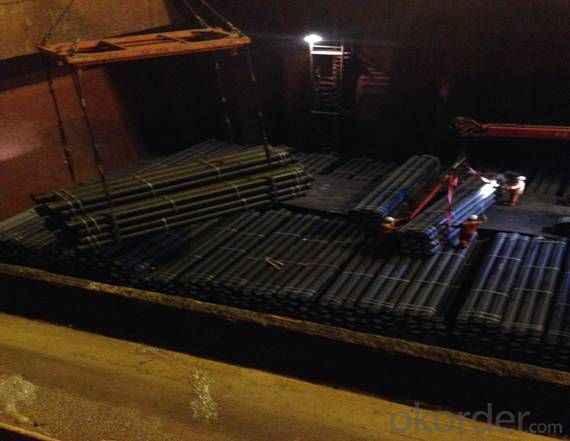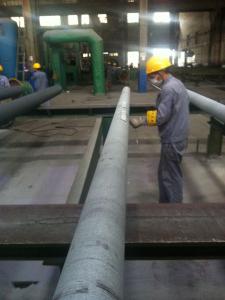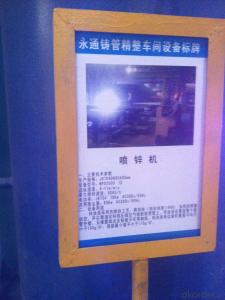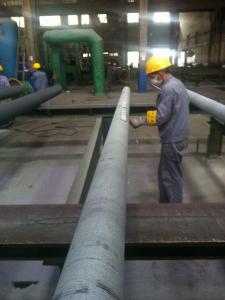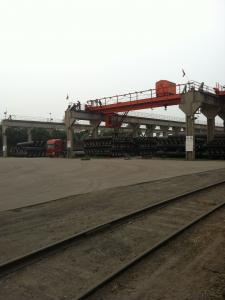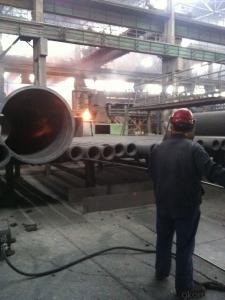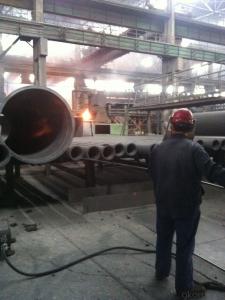DUCTILE IRON PIPES AND PIPE FITTINGS K9 CLASS DN1700
- Loading Port:
- Tianjin
- Payment Terms:
- TT OR LC
- Min Order Qty:
- 22 pc
- Supply Capability:
- 3000 pc/month
OKorder Service Pledge
OKorder Financial Service
You Might Also Like
Material : Ductile Cast Iron
Size Range : DN 80mm to DN 2000mm
Unit Effective Length : 6m or 5.7m
Manufacture Standard: ISO 2531:1998/ EN 545:2006/EN 598:2007
Annual capacity : 200,000 tons
Coating Exterior: Zinc 130g/m2 according to ISO 8179-1 and bitumen coating 70 microns.
Cement Interior: Portland Cement/ High Alumina Cement/ Sulphate Resisting Cement Lining according to ISO 4179
Special requirements on external coating and internal lining can be applied
We also provide accessories such as SBR/EPDM rubber gaskets, lubricant paste, pipe caps, PE sleeves, etc.
Additional Parts:
Each pipe is strictly inspected according to related standard to ensure permanently high performance.
Easy Installation at site and service free for life
Long Service Lifespan
Quotation will arrive you within 24hours once we get your inquiry.
We guarantee offering you a competitive price.
A copy of original inspection reports of pipes will be offered after shipment.
Photos of loading process will be sent to the customer after shipment effect.
We will follow-up the delivery progress after shipment effect and update to the customer on weekly basis.
- Q: What is the expected burst pressure of ductile iron pipes?
- The expected burst pressure of ductile iron pipes can vary depending on various factors such as the pipe diameter, wall thickness, and the specific grade of ductile iron used. However, in general, ductile iron pipes typically have a burst pressure ranging from 350 to 700 psi (pounds per square inch).
- Q: How do ductile iron pipes handle water velocity?
- Ductile iron pipes are capable of handling high water velocities due to their inherent strength and durability. The material's flexibility enables it to withstand the force and pressure created by fast-moving water, making it suitable for applications where high water velocity is a concern.
- Q: Can ductile iron pipes be used for irrigation of sports fields?
- Yes, ductile iron pipes can be used for irrigation of sports fields. Ductile iron pipes are known for their strength, durability, and flexibility, making them an ideal choice for various applications, including irrigation. These pipes have high resistance to external pressures and impact, which is beneficial for sports fields that may experience heavy foot traffic and potential damage. Additionally, ductile iron pipes have excellent corrosion resistance, ensuring long-term performance and minimal maintenance. Their smooth interior surface also allows for efficient water flow, preventing clogs and ensuring adequate irrigation for the sports fields. Overall, ductile iron pipes are a reliable and suitable option for irrigation systems in sports fields.
- Q: What are the different methods for anchoring ductile iron pipe?
- There are several methods for anchoring ductile iron pipe, including thrust blocking, concrete encasement, pipe restraints, and thrust collars.
- Q: DN1800 can the length of ductile iron pipes be several meters? What is the total weight?
- In quality, the spheroidization of cast iron pipes is controlled to be 1-3 (spheroidization rate 80%), so the mechanical properties of the cast iron pipes, ductile iron pipes and finished product libraries can be better improved, with the nature of iron and the properties of steel.
- Q: How is ductile iron pipe protected against external corrosion?
- Ductile iron pipe is protected against external corrosion through a process called external coating. This involves applying a layer of protective coating, such as asphaltic or epoxy, on the outside surface of the pipe. The coating acts as a barrier, preventing moisture and corrosive substances from coming into contact with the iron, thus reducing the risk of corrosion. Additionally, cathodic protection methods, such as applying sacrificial anodes or using impressed current systems, may be employed to further enhance the corrosion resistance of the ductile iron pipe.
- Q: How are ductile iron pipes protected against external damage?
- Various protective measures are employed to shield ductile iron pipes from external damage. One commonly used method entails applying a protective coating to the pipe's outer surface. This coating acts as a barrier, preventing direct contact between the pipe and corrosive elements in the surrounding environment. Materials like epoxy, polyurethane, or zinc, which exhibit excellent resistance against corrosion, abrasion, and chemical attacks, can be utilized for this purpose. Furthermore, an additional layer of protection can be provided by encasing ductile iron pipes in a concrete or cement mortar lining. This lining not only reduces the likelihood of physical damage caused by external impacts or soil movement but also enhances the pipe's hydraulic performance by minimizing friction and maintaining a smooth flow of fluids. In addition, proper bedding and backfilling techniques are employed during the installation of ductile iron pipes. This involves using appropriate materials such as sand or gravel to support and stabilize the pipe, thereby minimizing the risk of external damage resulting from uneven ground settlement or heavy loads. Compacting the backfill material adequately is vital to ensure the long-term integrity and stability of the pipe. Regular inspection and maintenance are also crucial for safeguarding ductile iron pipes against external damage. Routine inspections can identify any signs of corrosion, coating deterioration, or physical harm, enabling timely repairs or replacement before significant issues arise. Additionally, employing proper cathodic protection systems can counteract electrochemical reactions occurring on the pipe's surface, preventing corrosion by applying an electric current. To summarize, the protection of ductile iron pipes against external damage encompasses the application of protective coatings, concrete or cement mortar linings, appropriate bedding and backfilling techniques, and regular inspections and maintenance. These measures collectively ensure the durability, longevity, and dependable performance of ductile iron pipes in various environments and applications.
- Q: Can ductile iron pipes be used for gravity flow applications?
- Yes, ductile iron pipes can be used for gravity flow applications. Ductile iron pipes are known for their strength, durability, and flexibility, making them ideal for various applications including gravity flow systems. They are commonly used in water and wastewater systems, storm drainage systems, and other gravity flow applications where the pipes need to withstand high internal and external pressures. Ductile iron pipes are able to handle the weight of the flowing fluid without the need for additional support, making them a reliable choice for gravity flow applications. Additionally, their corrosion resistance properties ensure long-term performance in underground or exposed environments. Therefore, ductile iron pipes are suitable and commonly used for gravity flow applications.
- Q: Ductile iron 600-3 grade, tensile strength, how to test, there is a simple way?
- 600-3 is pearlite + a small amount of ferrite matrix ductile iron. Pearlite edge region. 10%, center. 70600-3. Two sets of numbers indicating the grades and mechanical properties of nodular cast iron. The former represents the minimum tensile strength
- Q: Can ductile iron pipes be used for firefighting systems?
- Ductile iron pipes are capable of being utilized in firefighting systems. This material, known for its strength and resilience, can withstand intense pressures and extreme temperatures, thereby making it a suitable option for transporting water in such systems. Moreover, the pipes' resistance to corrosion and ability to handle external loads guarantee their long-term dependability and effectiveness. Furthermore, ductile iron pipes possess exceptional fire-resistant qualities, as they are non-combustible, do not emit harmful fumes, and do not contribute to the propagation of fire. Consequently, due to their robustness, durability, and fire resistance, ductile iron pipes are widely chosen and trusted for firefighting systems.
Send your message to us
DUCTILE IRON PIPES AND PIPE FITTINGS K9 CLASS DN1700
- Loading Port:
- Tianjin
- Payment Terms:
- TT OR LC
- Min Order Qty:
- 22 pc
- Supply Capability:
- 3000 pc/month
OKorder Service Pledge
OKorder Financial Service
Similar products
Hot products
Hot Searches
Related keywords
